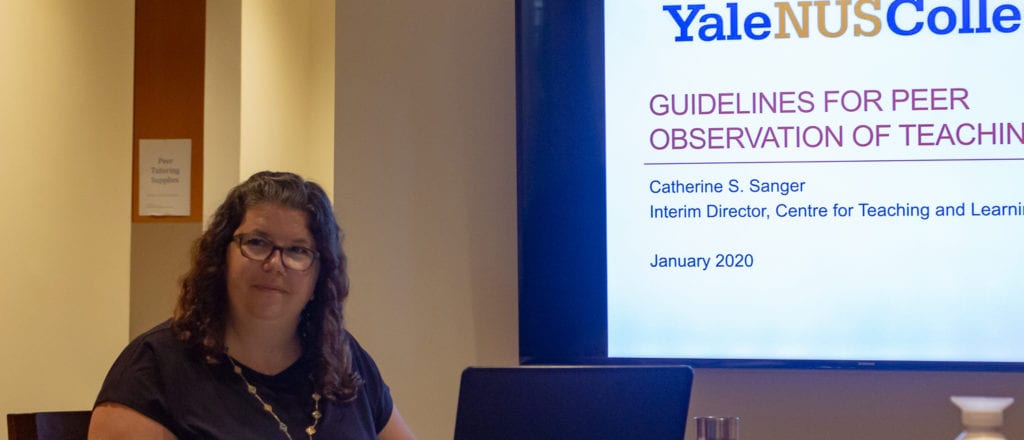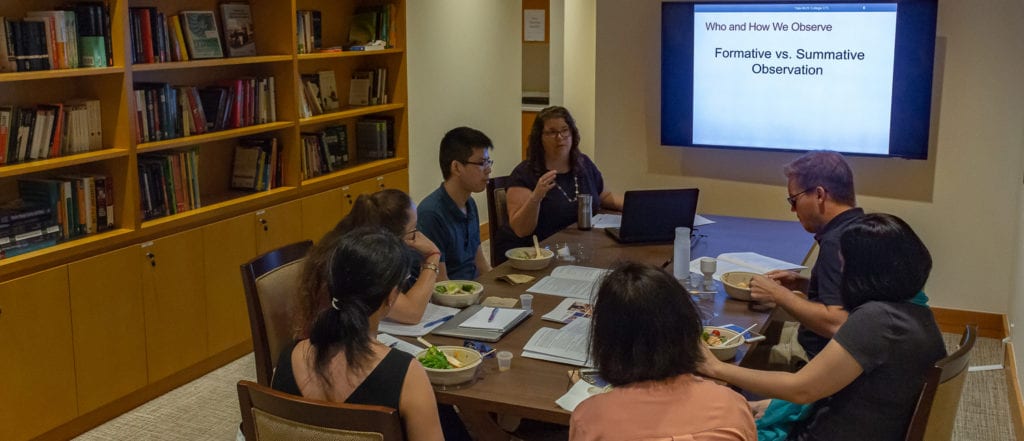Peer Observation – cultivating a culture of teaching excellence at Yale-NUS
 Interim director of the Centre for Teaching & Learning Dr Catherine Sanger conducting a workshop on peer observation of teaching. Image by Glen Ang for Yale-NUS College.
Interim director of the Centre for Teaching & Learning Dr Catherine Sanger conducting a workshop on peer observation of teaching. Image by Glen Ang for Yale-NUS College.
With a distinctive emphasis on interdisciplinary learning and teaching, Yale-NUS College values and celebrates teaching excellence. To this end, faculty members engage in peer observation to learn from and share ideas about teaching with each other.
“Having a second pair of eyes in the room is extremely helpful for gathering valuable feedback on what happens while the instructor’s attention is focused on executing a lesson plan,” said Assistant Professor of Science (Mathematics) Matthew Stamps, sharing his experience on having a peer observe his class.
Peer observation involves faculty members visiting each other’s classrooms, both formally and informally. To facilitate effective peer observation, faculty are encouraged to attend training workshops before conducting peer observations. These workshops, organised by the Yale-NUS Centre for Teaching & Learning (CTL), help them develop their approach to providing useful feedback and learn how to minimise unintentional bias.
“Peer observation is a mechanism to promote the sharing of ideas, collegial feedback, and promote a culture of innovation and reflection on our collective teaching practice,” said Dr Catherine Sanger, Interim Director of the Centre for Teaching & Learning. The CTL nurtures and recognises excellence in teaching and learning by helping faculty members achieve their teaching goals and supporting students via learning accommodations for special needs and the on-campus Peer Tutoring programme.
Observers look for indicators of good practices in undergraduate teaching in the observed faculty member’s classroom.
Whilst observing a peer’s class, Associate Professor of Humanities (Literature) Mira Seo notes who speaks when, how much time each activity takes, gender balance in discussions, and also how many laptops are open and what they are being used for during the class. These indicators enable her to gauge the level of student participation, depth of interaction between instructor and students, as well as the clarity of the lesson.
Classroom visits are followed by feedback, usually communicated over a conversation in the case of informal formative observations or a written report for formal summative observations.
 CTL Interim Director Dr Catherine Sanger conducting a lunch workshop on peer observation of teaching. Image by Glen Ang for Yale-NUS College.
CTL Interim Director Dr Catherine Sanger conducting a lunch workshop on peer observation of teaching. Image by Glen Ang for Yale-NUS College.
Besides facilitating training workshops, the CTL has also published a sourcebook on guidelines for peer observation of teaching. The sourcebook highlights three important benefits of peer observation. Firstly, peer observation helps faculty members develop best practice in teaching. Next, it enables collaboration and learning between colleagues. Faculty members benefit by sharing feedback with colleagues across a spectrum of seniority and disciplines.
Dr Sanger added, “This helps to provide faculty with a diversity of perspectives and allows for the transmission of good ideas around teaching across different communities within the faculty.”
Lastly, peer observation ensures that good teaching is recognised by the collegiate culture and for promotion decisions.
Being observed by a colleague can help a professor identify areas for improvement not already on their radar.
“I have found that many of the things I worry about (e.g., the legibility of my handwriting) are not problematic at all (at least in the opinions of my colleagues). However, other things I have not thought about at all could benefit from some additional consideration,” said Asst Prof Stamps.
One such aspect that he learned to give additional consideration to was acknowledging different types of classroom engagement. After an observer noticed that Asst Prof Stamps tended to interact more with and make greater eye contact with students who asked questions, he reflected on and re-examined what it means for a student to actively participate in class.
Consequently, he now makes a conscious effort to make sure every student is able to follow him during class and by interacting with every student during class activities. As a result, he is better able to recognise student participation and engagement, in ways other than the frequency of their questions, and is more inclusive in his teaching.
Observers also benefitted when they preview new teaching methods or view some familiar techniques being employed differently by their colleagues.
For instance, it was after seeing a lecture by Assistant Professor of Science (Life Sciences) Ajay Mathuru that Asst Prof Stamps learned about using a classroom response system called Poll Everywhere, as a tool to gauge students’ understanding of content.
The instructor prepares multiple-choice questions to test important concepts throughout the lecture via Poll Everywhere. If most students responded with the correct answer, the instructor confidently proceeds. If there is a mixed range of responses, the instructor will ask students to explain their reasoning behind each response and the lecture further examines the rationale behind the correct answer.
“This polling approach to lecturing is valuable — it encourages students to participate in a low-stakes, anonymous setting. It gives students immediate feedback on whether or not they have understood the lesson, and where the class is split on different answers, it is easier to initiate a conversation about what the correct answer might be,” added Asst Prof Stamps.
Reflecting on her similarly positive peer observation experience, Assoc Prof Seo said, “I feel very privileged to be invited into my colleagues’ classes as an observer because I always learn so much about the many different ways learning develops in the classroom. It’s exciting to see the magic happen!”





